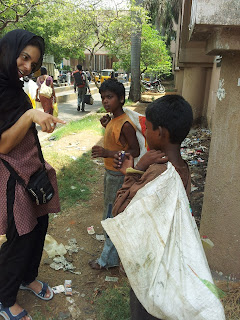This is why the Juvenile Justice Act is a "progressive" one - it not just underlines the need to deliver justice to those below 18 but also talks of following an empathetic, needs-based, reformist approach by all stakeholders while that is being done. This blog post is a story of a field-visit that my NPA squad undertook officially to get sensitized about the issues confronting the enforcement of this act.
We were asked to go to a prominent bus stand of Hyderabad and spot "Visibly Lost Children". Mr. Isidor Phillip, the social worker who helped us understand the importance of the act, defined them as children whose childhoods have been snatched away and they are left to fend for themselves in an alien environment with no meaningful choice to exercise.
So, off we went, dressed in our civil clothes, with vague notions of poor children in our minds, and a hidden desire to enjoy this day that has been freed of evening outdoor sessions. All of us have seen them - almost naked, lonely children - begging on our street lights, or selling barely-useful Chinese plastic-ware, or just taking care of their younger sibling on the side of the road. What we haven't done is to try talking to them. When we did try to talk - we were in for a surprise.
 |
| Visibly Lost Children who would run away as soon as we asked personal questions |
After a couple of hours of spotting helpless children, our teams found one child (age around 10 years) working in a restaurant in abysmal conditions and a girl child lost on the bus stand.
I turned my attention to the child labour Hussain, who was apparently sent off by his poor family, living in northern Karnataka as a sort of repayment of his father's debt to the owner of the restaurant. The boy was really shocked and afraid, as any child of his age, surrounded by 10 strangers in a room where a policeman stands guard outside, would be.
 |
| A frightened Hussain |
 |
| A pic clicked by Hussain |
 |
| It was a tough 2 hour deliberation session with the SHO, until he was told about the Govt. Order |
The SHO was in favour of dismissing them there and then. Mr. Isidore Philips had to refer to a govt. order of the same year so as to tell the SHO that Child Welfare Committee (CWC) will be the body to decide upon the two cases. This is the fate of Govt. Orders on the cutting edges of police organisations. When we don't know the law, how can we implement it?
This is where the role of IPS officers becomes important. They can actually make the enforcement meaningful, and once the people get a taste of these much-needed laws, they will begin to demand their enforcement. Until that happens, these officers need to act as change agents. After all, what excuse have we got in not doing the needful here? There will be no political intervention if we take an illegally-employed child labour from a commercial setup and send him home. We dont need extra funds or man-power to do that (especially in the cities where there are umpteen policemen posted in the name of routine protocol duties), all we need is a desire to deliver justice. So rather than waiting for a Supreme Court-driven initiative to reform our entire organisational setup, let us do our bit to deliver better justice while we can with the laws already there with us.


